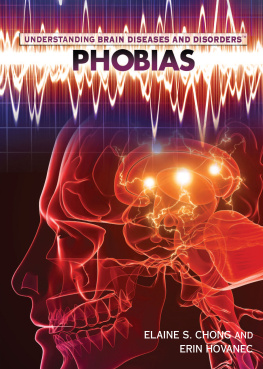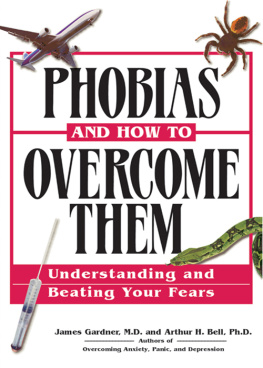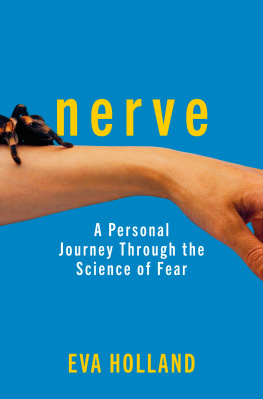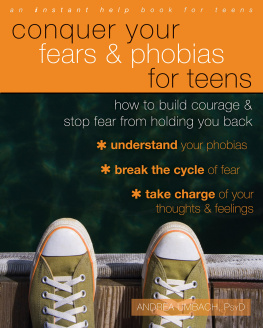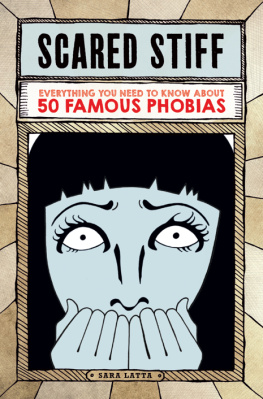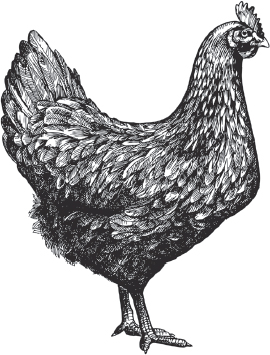
Text copyright 2019 Andrew Thompson. Design and concept copyright 2019 Ulysses Press and its licensors. All rights reserved. Any unauthorized duplication in whole or in part or dissemination of this edition by any means (including but not limited to photocopying, electronic devices, digital versions, and the internet) will be prosecuted to the fullest extent of the law.
Published in the U.S. by:
ULYSSES PRESS
P.O. Box 3440
Berkeley, CA 94703
www.ulyssespress.com
ISBN: 978-1-61243-932-7
Library of Congress Control Number: 2019905479
10 9 8 7 6 5 4 3 2 1
Printed in Canada by Marquis Book Printing
Acquisitions Editor: Bridget Thoreson
Managing Editor: Claire Chun
Project Editor: Claire Sielaff
Editor: Jessica Benner
Proofreaders: Lauren Harrison and Renee Rutledge
Cover and interior design: Jake Flaherty
Cover artwork: background Lukasz Szwaj/shutterstock.com; spider web Alexey Grigorev/shutterstock.com; clown Rusty Letter Images; mole rat Morphart Creation/shutterstock.com
Interior artwork: see
Contents
Introduction
Phobia? What Phobia?
Phobia (noun)an abnormally extreme fear or dislike of a particular thing or situation, especially one that does not have a rational explanation. [Origin: via Latin from Greek phobos, meaning fear.]
Well, thats about it in a nutshell. An irrational fear.
There are literally hundreds of phobias out there, and for those with a particularly jumpy disposition, theres a fear to suit every need and occasion. Everybodys heard of the fear of heights (acrophobia) and, thanks to the 1990 horror film Arachnophobia, most of us know about the fear of spiders. But what about the unusual pogonophobia (fear of beards), phasmophobia (fear of ghosts), or gynophobia (fear of women)? Then theres the downright extraordinary omphalophobia (fear of belly buttons), taphophobia (fear of being buried alive), and kinemortophobia (fear of zombies. Yes, zombies). How did they all come about?
And why the strange and unpronounceable names? Why not just call it zombiphobia so everyone knows exactly what youre scared of? As Shakespeare said, Its all Greek to me. The word phobia derives from the Greek word phobos, so nearly all of the phobia prefixes are Greek. Coulrophobia is the fear of clowns (of which Johnny Depp is a genuine sufferer). The coul comes from the Greek kolon, meaning limb in the sense of stilt walker or clown. Spiders, Clowns, and Great Mole Rats explains the origins of over 150 phobias and lets you in on a host of trivia for each one, like which celebrities are afflicted.
Did you know that alektorophobia is the fear of chickens? Yes, the small, flightless bird. And that Gustave Eiffel, designer of the Eiffel Tower, was actually an acrophobe? Some xanthophobes (who are afraid of the color yellow) refuse to leave the house on a sunny day, while triskaidekaphobes (who are terrified of the number 13) wont venture outside on the 13th of the month. And did you know that didaskaleinophobia is a fear of school (a trait that Mark Twains Tom Sawyer didnt technically have, despite his frequent truancy)? Or that hippopotomonstrosesquippedaliophobia, ironically one of the longest words in the English language, is actually a fear of long words? Are you familiar with koumpounophobia, the fear of buttons, a condition that Steve Jobs was afflicted with, leading him to the development of the touchscreen iPhone? Its time to find out all this and more.
Spiders, Clowns, and Great Mole Rats explains the fascinating origins of more than 150 bizarre phobias in an alphabetical journey through nearly every fear known to man, from the weird to the wonderful, the eccentric to the funny and, at times, the downright unbelievable. By the end of this book, youll know nearly everything there is to be afraid of.
But remember, as Franklin D. Roosevelt (a sufferer of triskaidekaphobia) famously said, the only thing we have to fear is fear itself. Fortunately, theres a phobia for that as wellphobophobia. Good luck out there!
A
Is for Alektorophobia
Ablutophobia
MEANING: fear of washing
ORIGIN: the Latin word ablutere, meaning to wash off
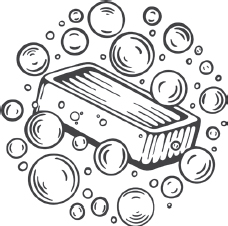
ABLUTOPHOBIA is the unwarranted fear of washing, bathing, or cleaning. This rare phobia is most prevalent in women and children, especially those with an emotional disposition. Ablutophobia is thought to be a legacy from the 16th century, when bathing was not a commonplace practice in Europe. Back then, too much washing was considered unhealthy, and most Europeans displayed symptoms of ablutophobia. While today bathing is very much encouraged (and almost essential if youre going to socialize), some European descendants still suffer from the condition. Traumatic causes, like a bad experience slipping in the bath and hurting yourself, can cause ablutophobia, as can watching really scary bath-related movie scenes, like the troubling shower scene in Psycho. The idea of bathing induces breathlessness, nausea, and clouded thinking, resulting in an inability to bathe, shower, clean the house, or wash clothes. In severe cases, victims end up living in extremely unsanitary environments and, as a result, become prone to illness and disease. Neuro-linguistic programming, as well as hypnosis, have been used to treat this debilitating phobia. Sometimes medication is used, as recovery is essential if the sufferer is going to have any form of social life, because, lets face it, nobody likes hanging around someone who stinks. That said, just because you do a dirty job for a living doesnt mean you have ablutophobiathat is, unless you dont bathe regularly.
THINGS TO AVOID: baths; showers; taps; swimming pools; oceans and other bodies of water; water generally; the song Ablutophobia by New Zealand artist Sheep, Dog & Wolf; the 2006 comedic play The Mistakes Madeline Made, which features a character who develops ablutophobia; the Friends episode The One with Joeys Dirty Day; the Bobby Darin song Splish Splash.
Phobia Trivia
Elizabeth I of England, who reigned as queen from 1558 to 1603, famously said, I take a bath once a month whether I need it or not. But far from being an ablutophobe, she was actually known as one of the cleanest people in Europe. Despite displaying symptoms of the condition, the populace werent ablutophobes (well, some of them probably were); bathing facilities were just simply not commonplace.
Statistics
According to a 2014 study, 66 percent of Americans shower at least once a day, while 24 percent admit to not washing their hands all the time after using a public toilet.
Achondroplasiaphobia
Next page


